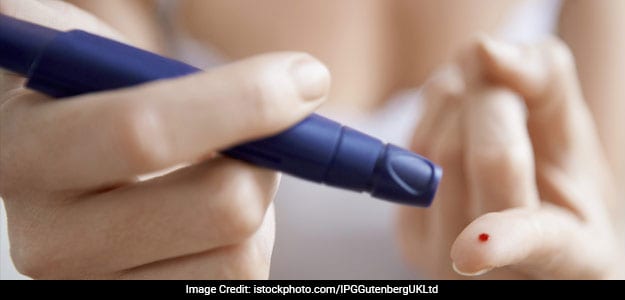In Type 2 diabetes, the body fails to use and store glucose properly because it is unable to produce enough of the hormone insulin or does not use insulin well.

Typically, type 2 diabetes develops in adulthood
HIGHLIGHTS
- Type 2 diabetics should relax their blood sugar control
- Current standard causes substantial harm without commensurate benefits
- Typically type 2 diabetes develops in adulthood
Many of the nation's 29 million people with Type 2 diabetes should relax their blood sugar control, an influential physicians group recommended Monday, arguing that the current standard is causing substantial harm without commensurate benefits. But the American Diabetes Association, the leading organization in the fight against the condition, said it disagrees with the new recommendation from the American College of Physicians and would not change its advice that Type 2 diabetics pursue tighter blood glucose control. The conflict may prove confusing for health-care providers and people with Type 2 diabetes, who make up 9.3 percent of the U.S. population.
"Yes, it will be," said Jack Ende, president of the American College of Physicians, which represents 152,000 doctors, most of the internal medicine physicians. "But we really believe this is important enough that we have to get the message out since we've seen more harms than benefits."
In Type 2 diabetes, the body fails to use and store glucose properly because it is unable to produce enough of the hormone insulin or does not use insulin well. Typically, this form of diabetes develops in adulthood, especially among people who are overweight, not physically active or have a family history of the disease, though it is increasingly appearing in younger people. (In Type 1 diabetes, which is much less common and often occurs in childhood, the pancreas completely stops producing insulin.)
The condition can lead to complications that include strokes, heart problems, kidney disease, blindness and amputations. In 2016, diabetes was the seventh-largest killer of Americans, with 80,000 deaths attributed to the disease, according to the National Center for Health Statistics.
For decades, a main tenet of diabetes management has been the importance of controlling the amount of glucose in the blood. That, experts believe, reduces the chances of complications. Patients have been told to aim for a hemoglobin A1C of 6.5 to 7 percent, which is a measure of glucose over the previous two to three months.
But prompted by what it considered conflicting advice, the college of physicians decided to review the research on the subject and the reasoning of other groups. It determined that the burdens of striving for the lowest score outweigh the benefits. The guidance issued Monday suggests that most Type 2 diabetics and their doctors aim for scores of between 7 and 8, though all care should be "personalized." For older people and those with other medical issues, the recommendation would not apply.
The physicians group said the harms include "hypoglycemic events," commonly known as low blood sugar, which, in the short term, can cause people with diabetes to feel woozy, lose track of their surroundings or lose consciousness. In the long run, they can lead to cardiovascular problems, Ende said.
The group also concluded that the burden of taking one or more medications to achieve tight glucose control can be greater than the benefit, in both side-effects and financial cost. Side-effects include weight gain, gastrointestinal problems, congestive heart failure, joint pain, fractures and genital fungal infections, according to the paper the organization released Monday, which was published in its journal, Annals of Internal Medicine.
Many people first try to control Type 2 diabetes with diet and exercise. The first medicine often prescribed is metformin, but others are sometimes necessary, and some people must inject themselves with insulin.
William Cefalu, chief scientific, medical and mission officer for the American Diabetes Association, said the organization is "concerned" about the guidelines offered by the physicians group. He said the same research reviewed by the college of physicians has convinced the ADA that tighter glucose control is preferable.
One study even showed a "legacy effect" of tight control four years after the research was concluded, he said.
"We take exception when they say 7 to 8 percent in most patients," Cefalu said. The ADA has recommended for years that Type 2 diabetics strive for a score of 7. The organization updates its guidelines for physicians and patients annually, he said.
© 2018 The Washington Post
(This story has not been edited by NDTV staff and is auto-generated from a syndicated feed.)
DoctorNDTV is the one stop site for all your health needs providing the most credible health information, health news and tips with expert advice on healthy living, diet plans, informative videos etc. You can get the most relevant and accurate info you need about health problems like diabetes, cancer, pregnancy, HIV and AIDS, weight loss and many other lifestyle diseases. We have a panel of over 350 experts who help us develop content by giving their valuable inputs and bringing to us the latest in the world of healthcare.














